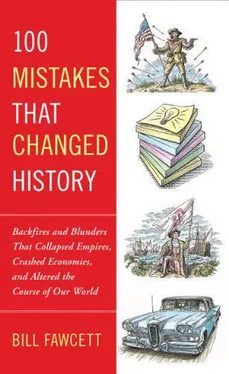A few harsh words about the invasion of Czechoslovakia, and there might not have been a World War II and nearly a hundred million lives would have been saved. Rather than supporting the Schwarze Kapelle, the British government chose appeasement. The world was never the same again.
70. DEALING WITH THE DEVIL
Green Light
1939
In August 1939 Joseph Stalin made a mistake, one that deeply affected not only the Soviet Union but also the rest of the world. The mistake was that on August 23, 1939, the dictator of the communist empire signed a secret protocol with Adolf Hitler. The document was a clear blueprint for a political alliance between Russia and Germany. It included economic exchanges, cultural exchanges, and even military cooperation. Effectively, this agreement laid the basis for the two nations to divide eastern Europe between them. One provision stated that should Germany invade Poland, Stalin would order the now-infamous “stab in the back.” Russia promised to also invade the already prostrate nation from the east and occupy a large part of it.
There was a very good argument to be made that it was to Russia’s advantage. Their army had been crippled by purges and the failures of a botched invasion of Finland. But by signing this pact with Germany, Joseph Stalin also guaranteed the start of World War II. One of the Nazis’ greatest fears was a two-front war. This had proved disastrous for Germany only a few decades before in World War I. This pact guaranteed that would not happen again. Ironically, they were right, and when Hitler chose to disregard the agreement two years later, it began a series of events that resulted in the total defeat of the Third Reich. The pact removed the last real check on German aggression. Britain and France maintained a continuing attitude of appeasement. America’s stand was one of adamant neutrality that even a concerned Franklin Roosevelt could not change. With Russia neutralized, there simply was no one else strong enough to stop the Nazis.
Stalin had many reasons to think this protocol was a good idea. One was that it left his own occupation of Ukraine, Belarus, the Baltic states, and the eastern part of Russia’s old nemesis, Poland, unchallenged. Another appeal was that it played to Stalin’s need to create a buffer zone that reached about 200 kilometers from the actual Russian border. Perhaps most important, Adolf Hitler had been working hard on the Western democracies to join with him in a crusade against the communists. Stalin had a real fear Hitler might succeed. It had been barely twenty years since most of the Western nations and Japan had sent military units into Russia to support the White Russian, anti-Bolshevik armies. Finally, it appears from the now-available records that Stalin actually believed that any war between Germany and Russia could be avoided. This was, in retrospect, wishful thinking, but that belief not only caused him to sign the protocol but also led to orders that crippled the Russian army when the Wehrmacht invaded two years later. So desperately did Stalin hold on to the belief that Hitler would obey the terms of this pact that German troops passed trains of raw materials from Russia still delivering resources as agreed, hours after Operation Barbarossa had begun in 1941. Leopold Unger, a Polish-Belgian author and historian, is unquestionably correct in calling the 1939 protocol the “most cynical operation of the World War II, and the founding document of the post-war Soviet empire in Europe.” This agreement also effectively ended discussions on another pact, the Tripartite Pact between Britain, France, and Russia, which was also designed to ensure peace and hold Hitler at bay. So, effectively, Stalin decided to believe Adolf Hitler and Germany—which had attacked Russia in World War I—instead of trusting his allies from that same war.
In the lens of history, there are fewer more obvious, world-changing mistakes than Joseph Stalin cutting a deal with the devil. Perhaps the only greater mistake Stalin made was believing that the agreement was anything but Realpolitik: something cynically done by Hitler only for passing expediency. So while the Nazi- Soviet pact of 1939 gave Russia the illusion of security, in reality it gave the Nazis a green light to attack Poland and then France. It was a major factor in the start of World War II. Believing the assurances of peace with Russia, which Hitler betrayed the first chance he got, was more than just a mistake. It sold out not only Poland and western Europe but, in the end, was even more costly to Russia itself. Almost exactly two years after signing the nonaggression and cooperation pact, Hitler attacked Russia. Stalin was so dismayed that he had a virtual breakdown and was ineffective for the crucial first days of the invasion. The result of his mistake was the loss of millions of Russian lives, half the Russian population suffering from Nazi occupation, and the destruction of much of the manufacturing base of the Soviet Union. It was a terrible price for a short-term agreement. Rarely has anyone’s judgment proven so wrong.
Totally Wrong
1939
The Maginot Line was built by France in reaction to the slaughter of more than 1 million French soldiers in World War I. Before that war, the French military doctrine had been unchanged from when Napoleon I was emperor. If you wanted to win a battle, you attacked. Courage would overcome any enemy and guarantee victory. Admittedly, the doctrine had not worked so well even for Napoleon at the Battle of Nations or Waterloo, but France stuck with it. Then came World War I and the trenches. Attacking through barbed wire against modern artillery and machine guns proved fatal and useless. But it took the French generals almost two years and a mutiny to understand this.
The result of the French people’s revulsion to the horrific losses in World War I was to go to the other extreme. The leaders of postwar France decided that if total offense was a disaster, total defense must be the answer. France, since Vauban and Louis XIV, had been the leader in building fortresses, so fortresses it would be. The result was the construction of the Maginot Line at the cost of more than 3 billion francs. That amount today, were it an equivalent portion of the U.S. annual budget, would be more than $3,000,000,000: That’s $3 trillion . But the problem was not cost. The mistake that the French made was that the French built only half of the line.
The Maginot Line was not a single line of forts. It was rather a continuous series of defensive positions. The line included everything from small machine gun bunkers, some remote-controlled using periscopes, to massive artillery cupolas that would have been impressive on a battleship. In places, the defenses ran more than ten miles in depth. The forts were well stocked with everything from artillery shells to vintage wines and were ready to hold off any German attack for weeks without resupply. The Maginot Line was originally planned to run the entire length of the northern border of France. Half that border was with Germany. The other half ran along the border with Belgium. The first half, the portion that ran along the German border, was completed in the 1930s.
When construction of the Maginot Line reached the 150-mile border between France and Belgium, the government of Belgium objected. They refused to accept anything on the border because it inferred they would be abandoned by the French in the event of a German attack. But they also refused to allow the French to help them build anything along their border because it might serve as a provocation to the Germans. Belgium threatened that if the French built anything at all, they would ally themselves with Germany.
Читать дальше












